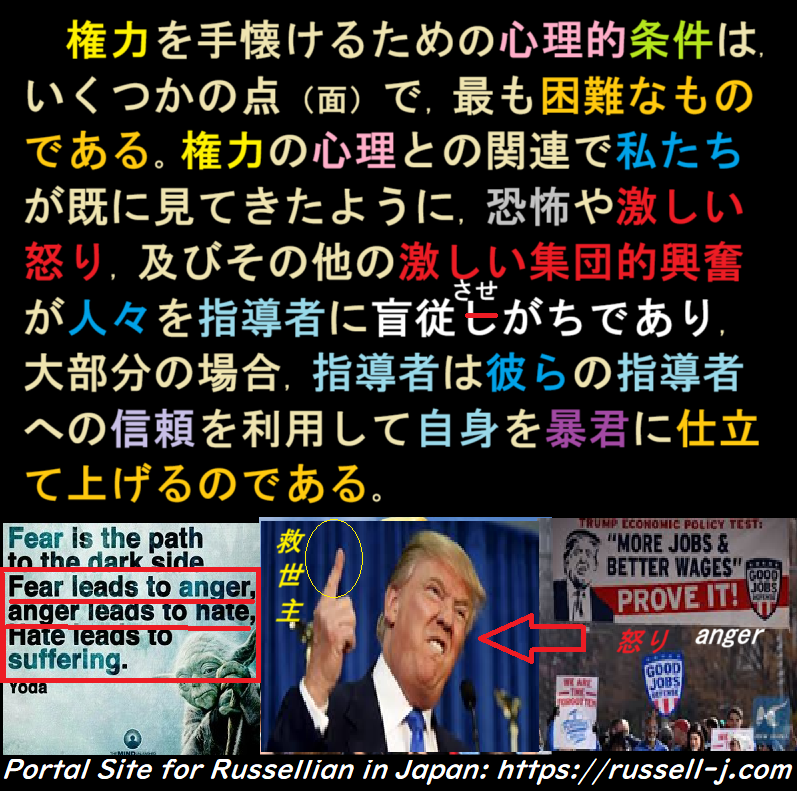
権力を手懐けるための心理的条件は,いくつかの点(面)で,最も困難なものである。権力の心理との関連で私たちが既に見てきたように、恐怖や激しい怒り、及びその他の激しい集団的興奮が人々を指導者に盲従させがちであり、大部分の場合,指導者は彼らの指導者への信頼を利用して自身を暴君に仕立て上げるのである。
The psychological conditions for the taming of power are in some ways the most difficult. In connection with the psychology of power we saw that fear, rage, and all kinds of violent collective excitement, tend to make men blindly follow a leader, who, in most cases, takes advantage of their trust to establish himself as a tyrant.
Source: Power, 1938.
More info.:https://russell-j.com/beginner/POWER18_270.HTM
<寸言>
テレビ放送は公共性が高く、不特定多数が視聴するため、一方的な意見ばかりを流すことは少なく、情報の正確性や公平性がある程度担保されています。視聴者にとって有害となりかねない表現には、放送倫理上の一定の制約が働きます。
一方、SNSは利用者が自ら選択して情報を受け取るメディアであり、極端な意見や不快な内容であっても、「見なければいい」「ブロックすれば済む」といった個人の裁量に委ねられています。従って、明白な虚偽情報でない限り、SNS上では過激な発言も一定程度許容される傾向があります。
しかし、「SNSとはそういうものだ」と安心して構えているだけでは済まない面もあります。たとえば、2025年2月、トランプ大統領は米国際開発局(USAID)をめぐり「数十億ドルが盗まれ、民主党寄りの報道をするためにメディアに流れている」とSNSに投稿しました(朝日新聞、2025年2月16日)。この発言に対し、名指しされたメディアは「不正確な情報だ」と否定しましたが、投稿は世界中に拡散し、その混乱は日本にまで及びました。根拠を示さないまま影響力のある政治家が情報を流すことで、社会的な混乱や誤解が広がる典型例といえます。
このように、政治家が嘘を直接つかなくても、あいまいな情報や事実に基づかない“疑念”を示唆することで、大衆の感情を操作することが可能です。
「政治家は嘘つきの始まり」という揶揄が世界中で語られている背景には、こうした情報操作への懸念があります。同時に、政治家の言葉に熱狂し、盲目的に信じてしまう有権者の側の問題も見逃せません。
あなたは、政治に対して懐疑的な姿勢を取るタイプでしょうか? それとも理想を信じ、熱心に関わるタイプでしょうか?
Television broadcasting has a strong sense of public responsibility and is viewed by an unspecified large audience. As a result, it rarely delivers only one-sided opinions, and a certain degree of accuracy and fairness in the information is ensured. Expressions that could be harmful to viewers are subject to certain ethical restrictions under broadcasting standards.
In contrast, social media is a medium where users select the information they consume. Even extreme opinions or offensive content are left to the discretion of individuals, with the common response being "just don't look" or "block the source." Consequently, unless the information is clearly false, even radical statements tend to be tolerated to a certain extent on social media platforms.
However, we cannot afford to be complacent and simply say, "That's just how social media works." For example, in February 2025, President Trump posted on social media that "billions of dollars were stolen and funneled to media outlets to support pro-Democratic reporting" in relation to the United States Agency for International Development (USAID) (Asahi Shimbun, February 16, 2025). Although the media organizations named in the post denied the allegations as inaccurate, the post spread globally and the confusion even reached Japan. This is a typical example of how a powerful political figure can spread unverified information and trigger social confusion and misunderstanding.
In this way, even if a politician does not tell an outright lie, it is possible to manipulate public sentiment by suggesting vague information or casting doubt without a factual basis.
The widespread saying that "politicians are born liars" reflects a growing concern about this kind of information manipulation. At the same time, we must not overlook the responsibility of voters who become swept up in political rhetoric and blindly believe what they are told.
Are you the type who takes a skeptical stance toward politics? Or do you believe in ideals and engage with politics enthusiastically?